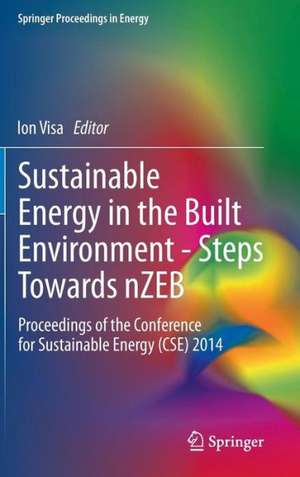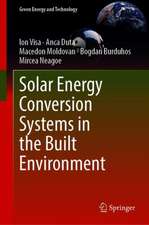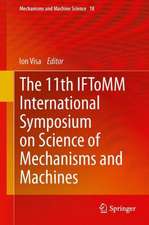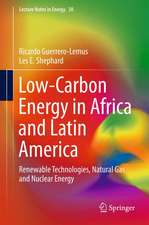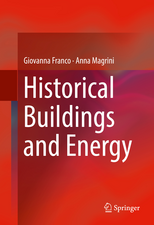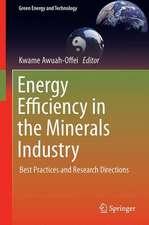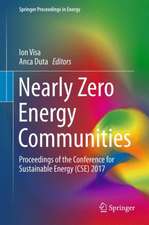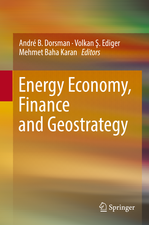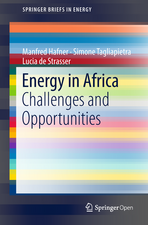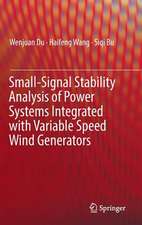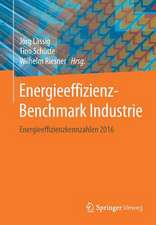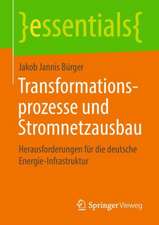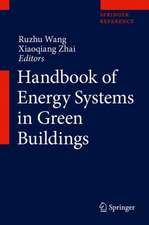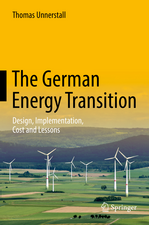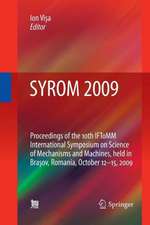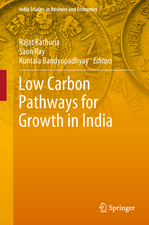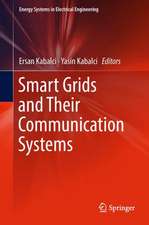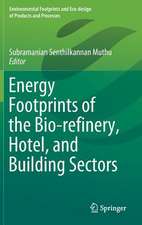Sustainable Energy in the Built Environment - Steps Towards nZEB: Proceedings of the Conference for Sustainable Energy (CSE) 2014: Springer Proceedings in Energy
Editat de Ion Visaen Limba Engleză Hardback – 30 sep 2014
The sub-chapters of the book were openly presented during the 4th Edition of the Conference for Sustainable Energy, held 6-8 November, 2014 and organized by the R&D Centre Renewable Energy Systems and Recycling at the Transilvania University of Brasov, Romania. This event was developed under the patronage of the International Federation for the Promotion of Mechanism and Machine Science (IFToMM), through the Technical Committee Sustainable Energy Systems.
Din seria Springer Proceedings in Energy
- 18%
 Preț: 1389.30 lei
Preț: 1389.30 lei - 18%
 Preț: 1237.80 lei
Preț: 1237.80 lei - 18%
 Preț: 1388.53 lei
Preț: 1388.53 lei - 24%
 Preț: 821.96 lei
Preț: 821.96 lei - 18%
 Preț: 1895.99 lei
Preț: 1895.99 lei - 18%
 Preț: 1109.16 lei
Preț: 1109.16 lei - 24%
 Preț: 1108.20 lei
Preț: 1108.20 lei - 18%
 Preț: 1386.92 lei
Preț: 1386.92 lei - 18%
 Preț: 1592.92 lei
Preț: 1592.92 lei - 18%
 Preț: 2126.60 lei
Preț: 2126.60 lei - 24%
 Preț: 1126.86 lei
Preț: 1126.86 lei - 18%
 Preț: 1265.39 lei
Preț: 1265.39 lei - 18%
 Preț: 738.06 lei
Preț: 738.06 lei -
 Preț: 420.97 lei
Preț: 420.97 lei - 18%
 Preț: 1111.22 lei
Preț: 1111.22 lei - 18%
 Preț: 1224.18 lei
Preț: 1224.18 lei - 18%
 Preț: 1409.03 lei
Preț: 1409.03 lei - 18%
 Preț: 1224.68 lei
Preț: 1224.68 lei - 18%
 Preț: 948.79 lei
Preț: 948.79 lei - 15%
 Preț: 638.57 lei
Preț: 638.57 lei - 18%
 Preț: 952.40 lei
Preț: 952.40 lei - 18%
 Preț: 1239.37 lei
Preț: 1239.37 lei - 18%
 Preț: 1848.33 lei
Preț: 1848.33 lei - 18%
 Preț: 1018.55 lei
Preț: 1018.55 lei - 18%
 Preț: 1378.59 lei
Preț: 1378.59 lei - 18%
 Preț: 1106.12 lei
Preț: 1106.12 lei - 18%
 Preț: 962.18 lei
Preț: 962.18 lei - 18%
 Preț: 1230.84 lei
Preț: 1230.84 lei -
 Preț: 428.68 lei
Preț: 428.68 lei - 15%
 Preț: 641.53 lei
Preț: 641.53 lei - 18%
 Preț: 1115.14 lei
Preț: 1115.14 lei - 18%
 Preț: 1230.35 lei
Preț: 1230.35 lei - 24%
 Preț: 1041.85 lei
Preț: 1041.85 lei - 18%
 Preț: 947.98 lei
Preț: 947.98 lei - 24%
 Preț: 784.32 lei
Preț: 784.32 lei - 18%
 Preț: 948.61 lei
Preț: 948.61 lei - 18%
 Preț: 1243.60 lei
Preț: 1243.60 lei - 18%
 Preț: 1015.23 lei
Preț: 1015.23 lei - 18%
 Preț: 1244.59 lei
Preț: 1244.59 lei - 24%
 Preț: 786.48 lei
Preț: 786.48 lei
Preț: 1238.74 lei
Preț vechi: 1510.66 lei
-18% Nou
Puncte Express: 1858
Preț estimativ în valută:
237.06€ • 246.58$ • 195.71£
237.06€ • 246.58$ • 195.71£
Carte tipărită la comandă
Livrare economică 14-28 aprilie
Preluare comenzi: 021 569.72.76
Specificații
ISBN-13: 9783319097060
ISBN-10: 3319097067
Pagini: 613
Ilustrații: XIII, 613 p. 338 illus., 235 illus. in color.
Dimensiuni: 155 x 235 x 30 mm
Greutate: 1.05 kg
Ediția:2014
Editura: Springer International Publishing
Colecția Springer
Seria Springer Proceedings in Energy
Locul publicării:Cham, Switzerland
ISBN-10: 3319097067
Pagini: 613
Ilustrații: XIII, 613 p. 338 illus., 235 illus. in color.
Dimensiuni: 155 x 235 x 30 mm
Greutate: 1.05 kg
Ediția:2014
Editura: Springer International Publishing
Colecția Springer
Seria Springer Proceedings in Energy
Locul publicării:Cham, Switzerland
Public țintă
ResearchCuprins
Foreword.- Part 1 Towards Nearly Zero Energy Buildings.- Part II Renewable Based Dhw, Heating and Cooling in the Built Environment.- Part III Renewable Based Electricity Production in the Built Environment.- Part IV Sustainable Built Environment Solutions.- Part V Sustainable Human Settlements.
Textul de pe ultima copertă
This book addresses the main challenges faced today in implementing the Nearly Zero Energy Buildings (nZEB) concept. The book starts with a chapter that addresses problems related to the energy demand and renewable energy sources available in the built environment, along with the restrictions and opportunities in developing sustainable, efficient and affordable solutions, also gaining aesthetic and architectural acceptance. Advanced solutions to cover the energy needs by using various renewable-based energy mixes are presented in two chapters. These two chapters discuss the problem of conversion efficiency at the level of components and systems, aiming at giving value to the variable renewable energy sources, in producing thermal and electric energy. The concept is discussed further in a chapter on advanced solutions for water re-use and recycling wastes as second raw materials. The need for new strategies and implementation tools, for education and training is addressed in the final chapter as part of the nZEB concept, towards sustainable communities.
The sub-chapters of the book were openly presented during the 4th Edition of the Conference for Sustainable Energy, held 6-8 November, 2014, and organized by the R&D Centre Renewable Energy Systems and Recycling at the Transilvania University of Brasov, Romania. This event was developed under the patronage of the International Federation for the Promotion of Mechanism and Machine Science (IFToMM), through the Technical Committee Sustainable Energy Systems.
The sub-chapters of the book were openly presented during the 4th Edition of the Conference for Sustainable Energy, held 6-8 November, 2014, and organized by the R&D Centre Renewable Energy Systems and Recycling at the Transilvania University of Brasov, Romania. This event was developed under the patronage of the International Federation for the Promotion of Mechanism and Machine Science (IFToMM), through the Technical Committee Sustainable Energy Systems.
